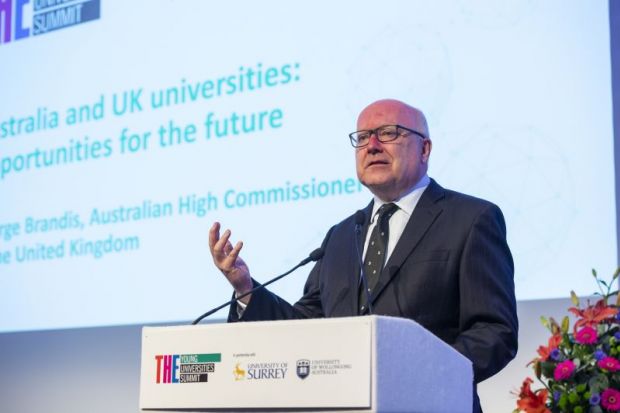The UK’s decision to leave the European Union presents exciting new opportunities for collaboration with Australian institutions, with ministers from both countries already preparing closer ties, according to a senior diplomat.
George Brandis, the Australian high commissioner to the UK, said that the “only upside” to Brexit was that the future for British-Australian university partnerships was “very bright”.
He told the Times Higher Education Young Universities Summit that, of the 1.3 million students enrolled in Australian higher education institutions, almost half – about 630,000 – are from overseas.
“For that reason…as well as the antique and historical reasons, Australian universities are and have always been – but never more so than now – internationally focused,” Mr Brandis said at the University of Surrey. He said that Surrey’s formal ties with Australia’s University of Wollongong – Surrey’s partner in hosting the event – were “emblematic of that commitment”.
Both Australia and the UK’s young universities are well matched in terms of strengths and performance, Mr Brandis added, and as such Australia was “very willing” to tighten its collaboration with the UK, “particularly among the young universities”.
“Although Oxford and Cambridge are at the top of the [league] tables…it is the universities in this [younger] cohort where the dynamism can most particularly be seen,” he said.
Mr Brandis said he recalled a telephone conversation he’d had with the UK prime minister Theresa May “about the opportunity for greater collaboration between Australian and UK universities, and of course, as I told her, she was pushing against an open door”.
The two countries have since committed to entering into a free trade agreement, “the preliminary discussions of which are now well advanced”, he added.
“We are looking to use the opportunities presented by Brexit to expand the scope and the ambition of our collaboration – in terms of access to the labour market, in terms of the ease with which scholars can live and work in our respective countries, in terms of opening up opportunities for students to study…and also in adopting a mutual level of recognition of professional standards,” he said.
“Like every other aspect of the economy, universities will be affected by Brexit,” Mr Brandis continued. “[But] regardless of your views…on the state of current British politics, let me make it very clear that when Brexit happens, and on whatever terms it does, the opportunities for even greater collaborations between Australian and UK universities will be enlarged.”
At the same event, Paul Wellings, Wollongong’s vice-chancellor, highlighted the increasing number of successful ties being formed by newer institutions across the world, adding “these are the partnerships that will solve major global problems”.
Mr Brandis concluded that, “whatever the dislocations or difficulties” that come from Brexit, “there are opportunities there to be seized”.
“The Australian sector is nimble, hospitable, adaptable and ready…and one of the principal drivers for that greater level of exposure will be young universities,” he said.
Register to continue
Why register?
- Registration is free and only takes a moment
- Once registered, you can read 3 articles a month
- Sign up for our newsletter
Subscribe
Or subscribe for unlimited access to:
- Unlimited access to news, views, insights & reviews
- Digital editions
- Digital access to THE’s university and college rankings analysis
Already registered or a current subscriber? Login










